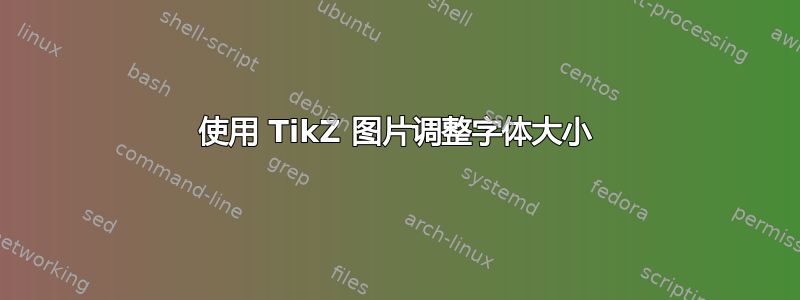
摘自 PGF 手册,
\begin{tikzpicture}
\draw [help lines] (0,0) grid (3,3);
\coordinate (a) at (rnd,rnd);
\coordinate (b) at (3-rnd,3-rnd);
\draw (a) -- (b);
\node (c) at (1,2) {x};
\draw let \p1 = ($ (a)!(c)!(b) - (c) $),
\n1 = {veclen(\x1,\y1)}
in circle [at=(c), radius=\n1];
\end{tikzpicture}
我想增加 的大小x。问题是我在同一个图表中有多个圆圈。其中一些需要更大尺寸的字体,而其他的默认字体就可以了。我该怎么做?
答案1
您可以像在普通 LaTeX 中一样更改 tikZ 节点内的字体大小 - 使用以下其中之一:
\tiny
\scriptsize
\footnotesize
\small
\normalsize
\large
\Large
\LARGE
\huge
\Huge
例如
\node (c) at (1,2) {\large x};
或者
\node (c) at (1,2) {\large $x$}; %note the \large *outside* the inline math
编辑: 更改字体大小里面数学模式,LaTeX 提供了以下命令:
\displaystyle
\textstyle
\scriptstyle
\scriptscriptstyle
使用 tikZ/pgf 提供的缩放算法(例如scale=...)会缩放“整个字符”,因此如果使用过多缩放,可能会看起来很丑陋。如果您使用上述命令设置字体大小,LaTeX 会为不同的字体大小选择不同的符号。这确保字体可读且具有足够的“细节”。如果您想要更极端的缩放,请使用scale=3.0节点的选项。
答案2
设置新样式,以便稍后使用。
例如:
\documentclass{article}
\usepackage{tikz}
\usetikzlibrary{calc}
\usepackage{relsize}
\tikzset{fontscale/.style = {font=\relsize{#1}}
}
\begin{document}
\begin{tikzpicture}
\draw [help lines] (0,0) grid (3,3);
\coordinate (a) at (rnd,rnd);
\coordinate (b) at (3-rnd,3-rnd);
\draw (a) -- (b);
\node (c) at (1,2) [fontscale=4] {x};
\draw let \p1 = ($ (a)!(c)!(b) - (c) $),
\n1 = {veclen(\x1,\y1)}
in circle [at=(c), radius=\n1];
\end{tikzpicture}
\end{document}
答案3
在顶部写上
\begin{tikzpicture}[thick,scale=1, every node/.style={scale=1.3}]
\draw [help lines] (0,0) grid (3,3);
\coordinate (a) at (rnd,rnd);
\coordinate (b) at (3-rnd,3-rnd);
\draw (a) -- (b);
\node (c) at (1,2) {x};
\draw let \p1 = ($ (a)!(c)!(b) - (c) $),
\n1 = {veclen(\x1,\y1)}
in circle [at=(c), radius=\n1];
\end{tikzpicture}
粗体会改变箭头,第一个比例会改变绘图的比例,但第二个参数会改变节点的大小,大概是文本所在的位置。这将改变所有节点的大小。
答案4
您可以使用命令font的选项\node。该font选项接受典型的字体命令,例如\node[font = {\Huge\bfseries\sffamily}, red](大字体大小、粗体、无衬线)。
(摘自手动的。
\documentclass{article}
\usepackage{tikz}
\usetikzlibrary{calc}
\begin{document}
\begin{tikzpicture}
\draw [help lines] (0,0) grid (3,3);
\coordinate (a) at (rnd,rnd);
\coordinate (b) at (3-rnd,3-rnd);
\draw (a) -- (b);
\node[font = {\normalfont}, red] (c) at (1,2) {x}; % <=== See here!
\draw let \p1 = ($ (a)!(c)!(b) - (c) $),
\n1 = {veclen(\x1,\y1)}
in circle [at=(c), radius=\n1];
\end{tikzpicture}
\begin{tikzpicture}
\draw [help lines] (0,0) grid (3,3);
\coordinate (a) at (rnd,rnd);
\coordinate (b) at (3-rnd,3-rnd);
\draw (a) -- (b);
\node[font = {\Huge\bfseries\sffamily}, red] (c) at (1,2) {x}; % <=== See here!
\draw let \p1 = ($ (a)!(c)!(b) - (c) $),
\n1 = {veclen(\x1,\y1)}
in circle [at=(c), radius=\n1];
\end{tikzpicture}
\end{document}
\tiny
\scriptsize
\footnotesize
\small
\normalsize
\large
\Large
\LARGE
\huge
\Huge
(摘自手动的。





